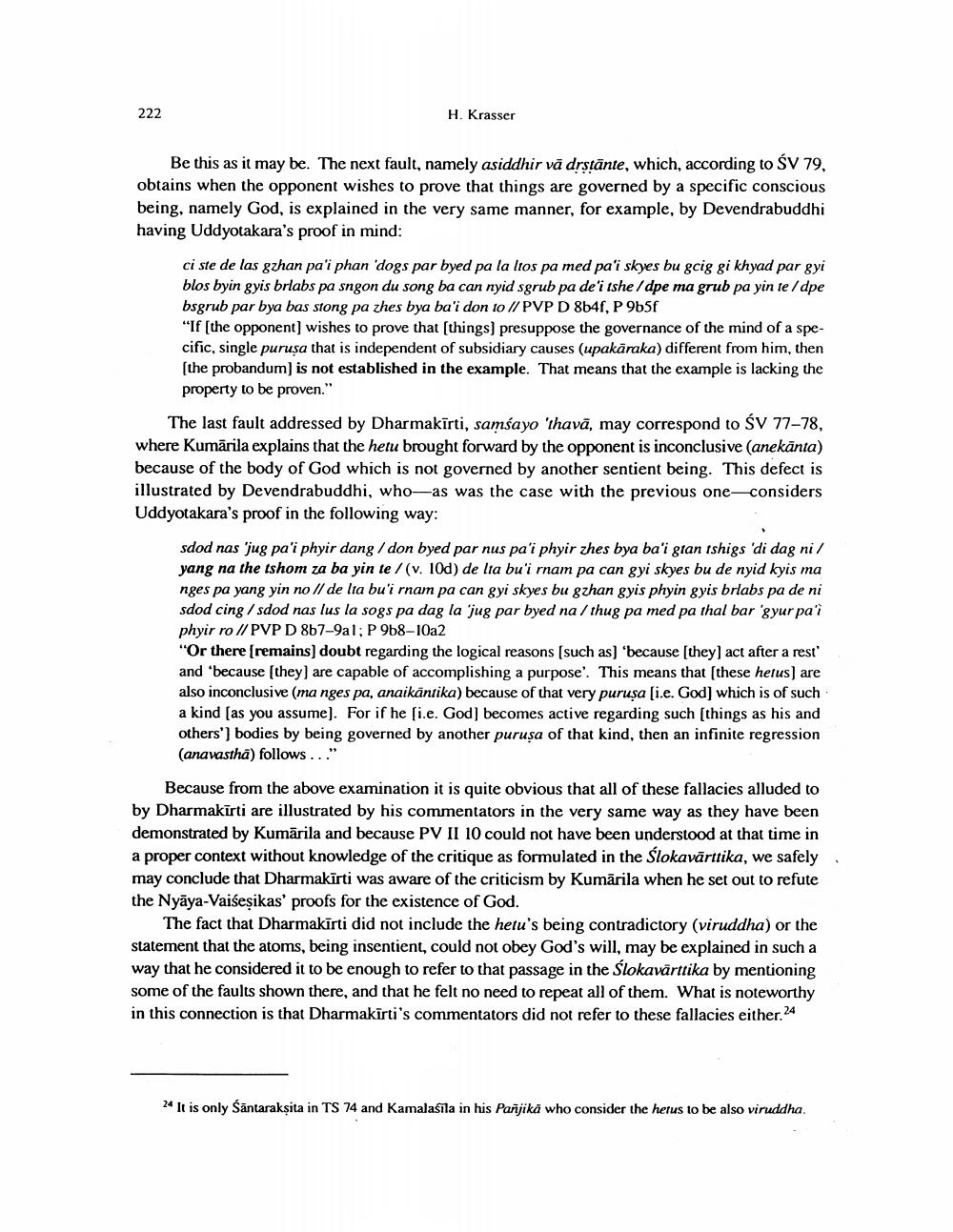________________
222
H. Krasser
Be this as it may be. The next fault, namely asiddhir vā drstānte, which, according to ŚV 79, obtains when the opponent wishes to prove that things are governed by a specific conscious being, namely God, is explained in the very same manner, for example, by Devendrabuddhi having Uddyotakara's proof in mind:
ci ste de las gzhan pa'i phan 'dogs par byed pa la ltos pa med pa'i skyes bu gcig gi khyad par gyi blos byin gyis brlabs pa sngon du song ba can nyid sgrub pa de'i tshe/dpe ma grub pa yin te /dpe bsgrub par bya bas stong pa zhes bya ba'i don to // PVP D 8b47, P 9b5f "If (the opponent) wishes to prove that things) presuppose the governance of the mind of a specific, single purusa that is independent of subsidiary causes (upakäraka) different from him, then (the probandum) is not established in the example. That means that the example is lacking the property to be proven."
The last fault addressed by Dharmakīrti, samsayo 'thavā, may correspond to ŚV 77-78, where Kumārila explains that the hetu brought forward by the opponent is inconclusive (anekānta) because of the body of God which is not governed by another sentient being. This defect is illustrated by Devendrabuddhi, who—as was the case with the previous one-considers Uddyotakara's proof in the following way:
sdod nas 'jug pa'i phyir dang/don byed par nus pa'i phyir zhes bya ba'i gtan tshigs 'di dag ni/ yang na the tshom za ba yin te/(v. 10d) de lta bu'i rnam pa can gyi skyes bu de nyid kyis ma nges pa yang yin no ll de lta bu'i rnam pa can gyi skyes bu gzhan gyis phyin gyis brlabs pa de ni sdod cing/sdod nas lus la sogs pa dag la jug par byed na /thug pa med pa thal bar 'gyur pa'i phyir ro // PVP D 867-9al; P 9b8-10a2 "Or there (remains) doubt regarding the logical reasons (such as) 'because [they act after a rest and because (they are capable of accomplishing a purpose'. This means that these hetus) are also inconclusive (ma nges pa, anaikāntika) because of that very puruşa (i.e. God) which is of such a kind (as you assume). For if he fi.e. God) becomes active regarding such things as his and others') bodies by being governed by another purusa of that kind, then an infinite regression (anavastha) follows..."
Because from the above examination it is quite obvious that all of these fallacies alluded to by Dharmakīrti are illustrated by his commentators in the very same way as they have been demonstrated by Kumārila and because PV II 10 could not have been understood at that time in a proper context without knowledge of the critique as formulated in the Slokavārttika, we safely may conclude that Dharmakīrti was aware of the criticism by Kumārila when he set out to refute the Nyāya-Vaišesikas' proofs for the existence of God.
The fact that Dharmakīrti did not include the hetu's being contradictory (viruddha) or the statement that the atoms, being insentient, could not obey God's will, may be explained in such a way that he considered it to be enough to refer to that passage in the Slokavärttika by mentioning some of the faults shown there, and that he felt no need to repeat all of them. What is noteworthy in this connection is that Dharmakīrti's commentators did not refer to these fallacies either.24
24 It is only Śäntaraksita in TS 74 and Kamalasīla in his Panjikā who consider the hetus to be also viruddha.




